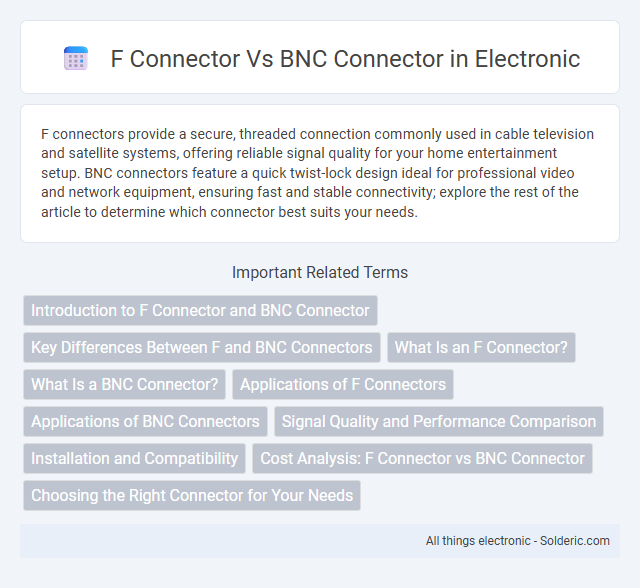F connectors provide a secure, threaded connection commonly used in cable television and satellite systems, offering reliable signal quality for your home entertainment setup. BNC connectors feature a quick twist-lock design ideal for professional video and network equipment, ensuring fast and stable connectivity; explore the rest of the article to determine which connector best suits your needs.
Comparison Table
| Feature | F Connector | BNC Connector |
|---|---|---|
| Type | Coaxial RF Connector | Bayonet Cable Connector |
| Common Use | Cable TV, Satellite, Broadband | Test Equipment, Broadcast, Networking |
| Impedance | 75 Ohms | 50 or 75 Ohms |
| Connect/Disconnect | Screw-on | Twist-lock Bayonet |
| Frequency Range | Up to 1 GHz | Up to 4 GHz (varies) |
| Durability | Moderate | High |
| Cost | Low | Medium to High |
| Typical Cable Types | RG6, RG59 | RG58, RG59, RG6 |
Introduction to F Connector and BNC Connector
F connectors are commonly used in cable television, satellite systems, and cable modems, characterized by their threaded design that ensures a secure, weather-resistant connection for coaxial cables. BNC connectors, favored in professional video and radio frequency applications, feature a bayonet locking mechanism for quick connect and disconnect capabilities, supporting frequencies up to several GHz. Understanding the differences in design and application helps you choose the right connector for your specific coaxial cable needs.
Key Differences Between F and BNC Connectors
F connectors are primarily used for cable television, satellite, and broadband internet connections due to their screw-on design ensuring a secure, weatherproof connection. BNC connectors are commonly employed in professional video, radio, and test equipment applications, featuring a bayonet-style locking mechanism for quick connect and disconnect capabilities. The key differences lie in their typical use cases, locking mechanisms, and impedance compatibility, with F connectors optimized for 75 ohms and BNC connectors available in 50 or 75 ohms versions.
What Is an F Connector?
An F connector is a coaxial RF connector commonly used for cable television, satellite television, and cable modems. It features a threaded, screw-on coupling mechanism that ensures a secure and reliable connection for RG6 or RG59 coaxial cables. Your choice of an F connector supports high-frequency signals up to 1 GHz, making it ideal for consumer TV and internet applications.
What Is a BNC Connector?
A BNC connector is a type of miniature quick connect/disconnect radio frequency connector used for coaxial cable. It is commonly employed in professional video, radio, and networking applications due to its secure bayonet locking mechanism and reliable signal integrity up to 4 GHz. Designed to connect coaxial cables to devices like oscilloscopes, radios, and CCTV cameras, BNC connectors are favored for their durability and ease of use in high-frequency transmissions.
Applications of F Connectors
F connectors are primarily used in cable television systems, satellite TV setups, and broadband internet connections due to their excellent performance at high frequencies and secure screw-on design. Their ability to maintain low signal loss and reliability in coaxial cable connections makes them ideal for residential and commercial video distribution applications. You'll often find F connectors in home entertainment systems where maintaining signal integrity is crucial.
Applications of BNC Connectors
BNC connectors are widely used in professional video and radio frequency applications, including CCTV systems, test equipment, and broadcast television due to their reliable quick connect/disconnect feature and consistent signal integrity at frequencies up to 4 GHz. Their secure bayonet locking mechanism makes them ideal for environments requiring frequent connection changes without compromising signal quality. You can commonly find BNC connectors in laboratory instruments, network analyzers, and RF signal distributions, where stable and high-frequency connections are essential.
Signal Quality and Performance Comparison
F connectors provide superior signal quality for high-frequency applications such as cable television and satellite systems due to their low signal loss and excellent impedance matching at 75 ohms. BNC connectors, commonly used in professional video and RF equipment, offer reliable performance but generally exhibit higher insertion loss and are rated for 50-ohm systems, which can limit their effectiveness in high-frequency broadband applications. The choice between F and BNC connectors significantly impacts overall system performance, with F connectors favored for consumer broadband and BNC preferred in specialized broadcast or test equipment environments.
Installation and Compatibility
F connectors offer simple, screw-on installation ideal for coaxial cables in satellite and cable TV systems, ensuring a secure and weather-resistant connection. BNC connectors require a twist-lock mechanism suited for professional video equipment and RF applications, providing reliable signal integrity in test instruments and broadcast setups. Your choice depends on compatibility needs, with F connectors common in consumer devices and BNC connectors preferred in professional audio-video and networking environments.
Cost Analysis: F Connector vs BNC Connector
F connectors typically offer a lower cost compared to BNC connectors, making them a budget-friendly choice for television and satellite cable installations. BNC connectors, known for their superior durability and locking mechanism, generally come at a higher price, which can impact total project costs in professional video setups. Your decision should balance the initial connector cost with the long-term benefits of reliability and signal integrity depending on your application needs.
Choosing the Right Connector for Your Needs
F connectors provide a secure, threaded connection ideal for cable TV, satellite, and broadband internet applications, ensuring minimal signal loss and reliable performance. BNC connectors use a bayonet locking mechanism, making them suitable for professional video equipment, radio frequency applications, and test instruments requiring quick, secure connections. Choosing the right connector depends on your specific use case, with F connectors preferred for residential cable setups and BNC connectors favored in professional audio-visual and networking environments.
F Connector vs BNC Connector Infographic

 solderic.com
solderic.com